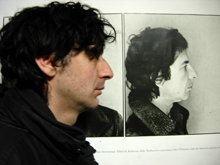Rosazia
By wavelength ~ Posted Tuesday, January 30th 2007
Friday, February 9 10pm @ horseshoe tavern
Purveyors Of: postmodern postpunk flute folk rhythm, stuck in the spokes of a bicycle
Rozasia is a collective composed of diverse Toronto artists and musicians, integrating immigrant, indie, hipster, “white trash” and other cultures and sub/countercultures. It gives them quite a palette of ideas and sounds; vocally they draw on various languages, weaving their tales even while they reduce/raise language to a level of raw sound. Rozasia represents, but Rozasia also embodies, as their amazing music and live shows condense all these ideas into a crazy knot of musicians, band, stage, music, noise, body, crowd and experience. You’d have to see it to believe it, and even then you wouldn’t understand it. Demian did his best to make some meaning, and four band members did their best to destabilize.
Who are all your band members? What cultures, interests, styles, disciplines, contributions?
Eugene Slominerov: We are all very interesting people. We have a website. We are interested in the arts.
Alia O’Brien: Every person in Rozasia is most likely 1) an individual and 2) a member of at least one group. We all have our born-into cultures in addition to our adopted cultures; I’m not really sure which are which.
Are you still at the house on Major Street? What kinds of space do you make your music in?
Robin Fry: We work best in spaces where we compete for volume with the metal bands. Otherwise we compose at 19 Major together, often over tea. Here we adjust to a new sensitivity of quietude where it becomes necessary to wear earplugs only for the thunderous breaking of the ginger snaps.
Jon McCurley: A few times we played in the basement and the landlord or the landlord’s daughter came to the door in tears, because it was too loud. Then once I saw her at Value Village and she was sitting on a sofa polishing a shopping cart full of brass candelabras. She said it was one of her haunts, so how trustworthy can her sensibility be?
Alia: We make our music in various types of energy waves whose behaviours are dictated by the laws of physics.
What are your modes and means of production? Your creative process?
Jon: We go into a little room with bad lights and play so loud nobody knows what’s happening, and then the tape of it just sounds like dzzzzzzzdzzzzzzzzzzz and that’s it. Then we’ll play somewhere and it will sound so indiscernible and we’ll get asked to come and play again.
Eugene: We collaborate within a main framework, lately inspired by our bass player’s genius and work ethic. I like to sing and write and argue.
What on earth are you screaming about? What kinds of imagery and language might there be running through your music?
Eugene: A few songs are “concept” songs in Russian, describing imaginary and real people within a non-existent bohemian paradigm. I give them names and gossip about them.
What is this “tropical” theme that you’ve talked about? What does it mean?
Eugene: As musicians we take responsibility to learn about all kinds of music and make conscious choices to reflect on certain genres when in composition. In the last year we have been going to a lot of clubs and DJ nights and are only beginning to understand dance music and the brutal vitality of its culture.
Robin: We like to use the tropical world as a blueprint for the thriving violence we mean to capture in our music. And you should watch Jonny do flipping tricks with his plastic dinosaur.
Alia: We have so far created a species that resembles the Blue Fugates from Eastern Kentucky.
Now that Wavelength is seven years old, it seems fitting to ask: what are your thoughts about the state of the Toronto indie music scene, past/present/future?
Jon: I think it will feel like it’s good, like you’ll see some weird guys do something weird and it’s great and then you hear that guy isn’t making music anymore, why not? And no one talks about their music idea ever again. Poof, no one remembers. It’s like it disappears, it seems fun, but then everyone wanders off. It’s like there’s no glue or something.
By Demian Carynnyk
